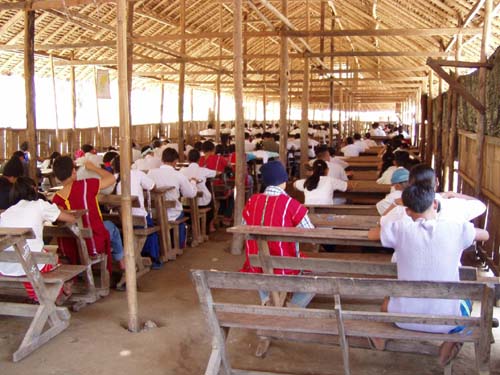Karen Education
|
For many Karen, education is the path that will lead them to regain their land and the peace and harmony they so desperately desire. Despite overwhelming odds, they are very keen on educating their youth. For many of them it is crucial to be educated so that when Burma is free they can contribute to making a peaceful society where all ethnic people are involved. There are many organizations working towards the education of Karen of all ages, from organizations begun by the Karen themselves to International NGOs (non-governmental organizations). However, due to the unstable situation, it is very difficult to organize all the schools and train the teachers. They are still working to standardize the curriculum for the refugee camps. The instability within their homeland, the lack of higher education opportunities, overcrowded classrooms, and little or no classroom materials has created an enormous challenge for students and teachers alike. Many teachers do not last very long; the job is difficult and underpaid. In Karen State, where food is already scarce, the villagers have a hard time providing food for the teachers. In the refugee camps, teachers earn around $125 for the year.
In their homeland, the Karen are either hiding out from the SPDC (Burma Army) or under their control, in which case, the school is forced to incorporate Burman curriculum. The Karen language is outlawed from these schools. The IDPs (Internally Displaced People) face the worse conditions, but are highly motivated to educate the youth. Despite always being on the move, having their schools destroyed by SPDC, and little to eat, the IDP teachers and students are working hard to establish a good base of education. Once in a refugee camp, the conditions are vastly improved. However, there is still far to go for even a small chance at a University degree. It is through the hard work of the education organizations and teachers that students have the opportunity to study. Still, constantly under the feeling of imprisonment, teachers struggle to teach lessons in the loud and overcrowded classrooms. The teachers themselves do not have the high education standards typical in most countries. After finishing 10th grade, students are qualified to be high school teachers. In a recent survey of refugee camps conducted by ZOA (a Dutch education NGO), "70% of the teachers stated they feel they do not have sufficient skills and knowledge for teaching." Only 41% of the sample group has received any teacher training. Another major obstacle is that the official language of the secondary schools in the camps is English, and among the parents, 70% of those sampled cannot read English at all. Imagine not being able to read any of your teenager's homework. |
